#I'm going to draw on it to make it Batman themed since it's red and also weirdly enough has stickers onit
Text
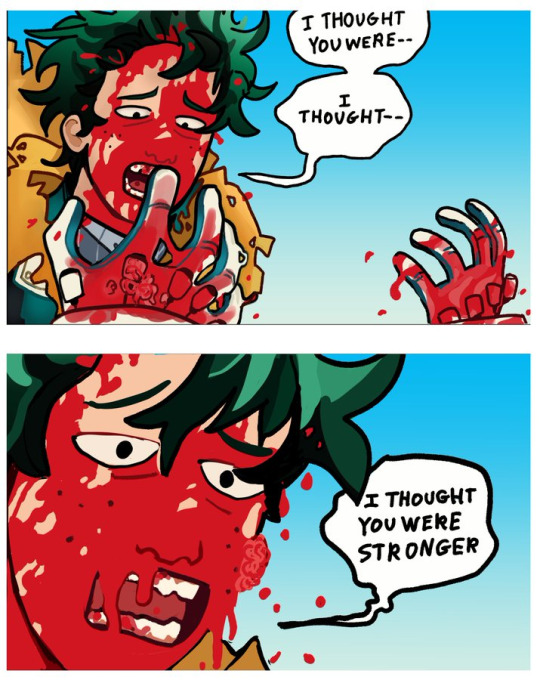
Art credit: @/charscounterattack reposted with permission.
INVINCIBLE VS. MY HERO ACADEMIA: WHEN HEROES KILL
Whether or not heroes should kill people is a hotly debated topic in comics.
There are people who think heroes should never kill, and others who think heroes should kill more. One of the most famous comic book storylines "Under the Red Hood" has Red Hood / Jason Todd debate whether or not it was ethical for Bruce to keep letting the joker live even after the Joker killed Jaso, especially after the Joker killed Jason. If killing the Joker earlier to prevent all future deaths would have been justified. There are like a hundred DC Aus that are like "What if Batman and Superman just started killing people?"
In order to explore this question I'm going to explore two situations in different comics, Invincible and My Hero Academia when the hero, a very idealistic young hero kills someone for the first time.
LET HORI COOK
Storytelling, especially for serialized storytelling which comes out week by week instead of all at once works on the premise of drawing people in by promising that certain future developments and plot points are going to happen. Stories are all about creating expectations, building them, and then paying them off.
Here's an example: The Dabi is a Todoroki theory has existed pretty much since the training camp arc. Horikoshi wasn't in your face about the hints about Toya, but there was just enough hints to make the theory seem more and more plausible. Toya having the same fire quirk as Shoto / Endeavor. Toya mentioning both of them by name. Shoto's two other siblings getting revealed but not Toya. Toya saying that Hawks should have paid attention to him most of all. All of these little pieces came together until Toya finally revealed his identity on live TV in front of both Shoto and Endeavor.
This worked because not only did it give the audience just enough clues that they felt smart for figuring it out, and get invested in the idea of Toya as a Todoroki, it also was well-paced so it didn't seem like Horikoshi forgot about it unlike the traitor plot which went hundreds of chapters without being mentioned. If Toya was revealed to be a Todoroki at the training camp arc with no buildup, it wouldn't be as effective bcause we didn't have years of waiting and theorizing. If Todoroki was revealed to be some guy named Steve after all the hints, it also wouldn't be an effective reveal because there were hints dropped for Toya Todoroki, but there were no Steve hints so it'd feel like the author lied to us.
Themes are like this too. I tend to explain story themes by oversimplifying it as "Question, and answer." The story asks a question, it provides us an answer, and we can come up with our own answer as well. However, there's a middle part I'm skipping out on which is deliberation. Before you can come up with an answer, you obviously need to deliberate it, either by presenting arguments for or against, hearing outside opinions or just thinking things through.
In other words, you need to "Let things cook."
If Toya calling Shoto by his full name at the Training Camp Arc is when we're first asked "Is Toya a Todoroki?" or when the theories first started, then the long middle period between Training Camp Arc and the First War Arc is the deliberation. This is when the story not only added more hints to the idea that Toya was a Todoroki, but also set up why that reveal mattered. Endeavor wanted to atone for his past sins, but one of his victims was no longer alive. Endeavor begins to move on anyway and think he's finally made himself a good hero, but now Toya appears to flip up the reverse Uno Card.
So let's follow this basic formula, for how ideas get developed in My Hero Academia and just any good story.
Question / Introduction
Deliberation
Answer / Conclusion
My Hero Academia and Invincible explore similar themes in regards to heroism, generational trauma and how to be better than the previous generation in both Mark and Deku. I'm going to streamline their arcs down to one basic question for the sake of time. For both the question is:
Can I be a better hero than my Dad?
Deku and Mark might be two characters who cannot possibly seem to be more different, but you can actually list off a lot of similarities between them right away. Deku and Mark are both people who in a world oversaturated with superheroes spent most of their childhoods with no superpowers at all. Also, they were genetically supposed to inherit a quirk / viltrumite powers, but Deku was born quirkless, and Mark was an extremely late bloomer. They are also people who while being powerless civilians for most of their lives worship heroes. Deku collects so much All Might Merch he even stole some from Nighteye after he died, Mark attends comic conventions even after he becomes a superhero.
They also grew up worshipping one hero in particular who was essentially earth's strongest hero, for Mark it was his dad Omni-Man, for Deku it was All Might. They also both get the opportunity to train directly under their favorite hero immediately after they get their powers. At first this makes it seem like they've been given everything they've ever wanted. All Mark has ever wanted was to be a hero like his dad and make his father proud. Not only did Deku just want one person to tell him he could be a hero too even without a quirk, but his very idea of heroism is built around seeing All Might always save people with a smile.
However, both of them suddenly hit complication just when it seems like they've been given everything they've ever wanted. They are both confronted with the fact that their heroes are not who they expected them to be. They are overly idealistic heroes who have been dreaming of being heroes since childhood only to be hit with a much greyer reality. To the point where there innocence becomes a flaw in and of itself. The way they've been coddled and protected all of their lives leaves them completely unaware and unable to spot the grey areas in the world, or the people around them.
For Deku the moral greys exist in the villains around them. In MHA Society, villains are basically just bad guys in suits for the heroes to punch on television. They're seen as a faceless enemy, and there's very little in way of rehabilitation for villains once they're captured. Deku lived in a very black and white world before this point, and he's suddenly presented with the idea that his villains could be morally grey.
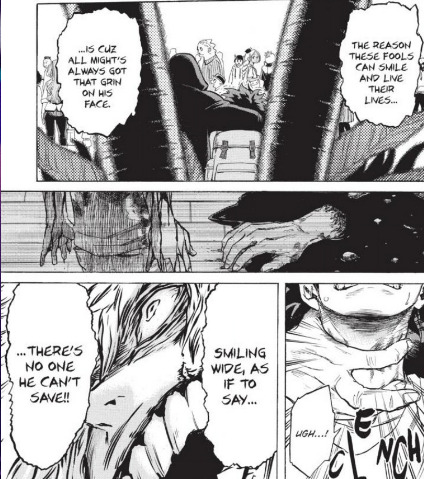
Deku's image of All Might is a hero who saves everyone with a smile, so he could never imagine that there are people who All Might has failed to save. He's never stopped to consider where villains came from, or if any of them might have legitimate reasons for their grievances.
This becomes a pretty central theme in MHA. It's first brought up here when Shigaraki talks about All Might acting as if there's no one he can't save. Twice brings it up again in his first backstory chapter, that the heroes only save the virtuous ones.
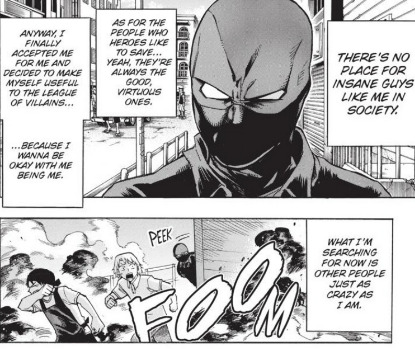
This is further enforced in the same overhaul arc with members who are loyal to Overhaul because they are society's trash who would have been thrown out otherwise. There is a group of people fiercley loyal to Overhaul who is a terrible boss, because he is the only person who would accept them.
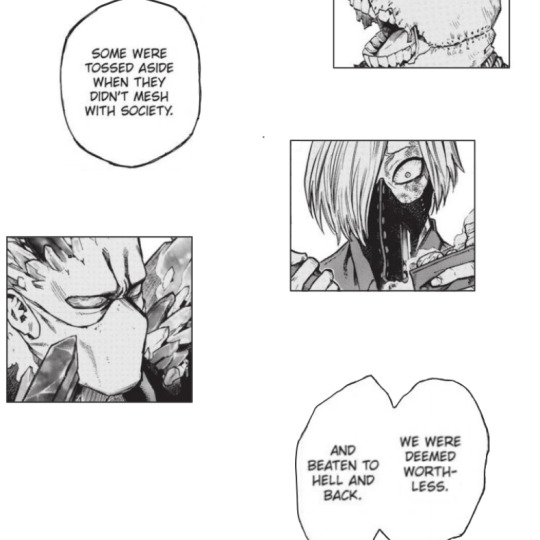
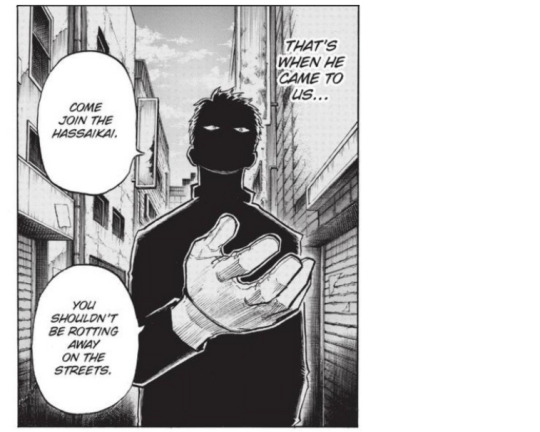
edits belong to @stillness-in-green from bring it all back a tone poem on returning to staus quo located here on ao3.
In the War Arc this long running theme basically reaches a climax with the Hawks and Twice confrontation, where Hawks decides to try to offer Jin a chance to restart because he's deemed him "good" but he won't extend the same helping hand to the league who Hawks has determined as "bad." He then asks Jin to betray his friends in order to be saved, something that Jin rightfully calls out.
That Hawks only wants to save Jin because he's one of the good ones, and he's written off the rest of the league and left them for dead. Hawks choosing to divide between good and bad victims ad only save the one he personally thought was worthy of redemption, makes it impossible for him to save Twice who would never under any circumstances give up on the rest of the league.
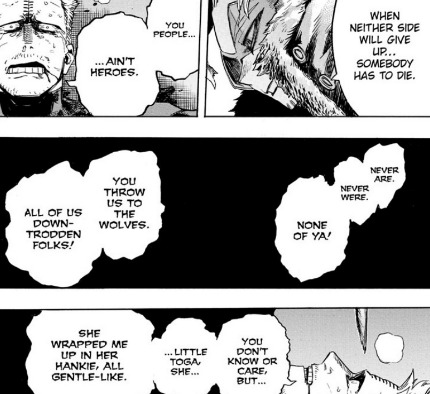
Twice's death is a tragedy, but it also presents us a clear example of the failures of the previous generation. Even a hero who sincerely sympathized with a villain and wanted to help them start over wasn't able to help them because of this attitude of selectively picking and choosing who to save. If the heroes only save the innocent the I guess the lives of the guilty are worth less.
This is the questio Toga poses to Ochako, if the heroes killed Twice then are you going to kill me in order to stop me. This is the central subject of Shigaraki's speech to the heroes. That heroes and villains will never uderstand each other, because the entire hero system perpetuates itself on ignoring the needs of societal outcasts and rejects in form of the "innocent people" and those outcasts who aren't having their needs met eventually turn into villains who get systematically put down by heroes. Heroes and villains are incapable of understanding each other and breaking the cycle, because the entire system isn't built on helping people, but merely maintaining the idea that heroes are perfect, faultless saviors so normal people will feel secure, while the people the heroes have failed get swept under the rug so society can keep "functioning."
"You heroes hurt your own families just to help strangers. You heroes pretend to be society's guardians. For generations, you pretended not to see those you couldn't protect. That means your system's all rotten from the inside with maggots crawling out. It all builds up, little by little, over time. You've got the common trash, all too dependent on being protected, and the brave guardians who created the trash that needed coddling. It's a corrupt, vicious, cycle. Everythig I've witnessed, the whole system you've built has always rejected me. Now I'm ready to reject it. That's why I destroy. That's why I took power for myself. Simple enough, Yeah? I don't care if you don't understand. That's what makes us heroes and villains."
So if the starting question is: Can I be a better hero than my dad?
Then everything I've detailed above is deliberation. Here we have, ever since the training camp arc, this slowly built up idea of why All Might was a flawed hero in the end.
Mark has to face the fact that his father is a more morally grey person than he could ever imagine, whereas Deku has to face the fact that the villains are more morally grey in his world, and that makes the heroes look more flawed in comparison as well. The deliberation is all slowly bringing Deku to think over what Shigaraki asked him all the way in the beginning in there first meeting.
Were there ever people that the heroes couldn't save? If so then what are you supposed to do with the victims you can't save after they grow up? This is when Deku begins to start forming his own answer.
Deku hears the advice of both the other OFA users, and The Stinky Old Man (Gran Torino) that killing Shigaraki is the best option, but wants to explore other options.
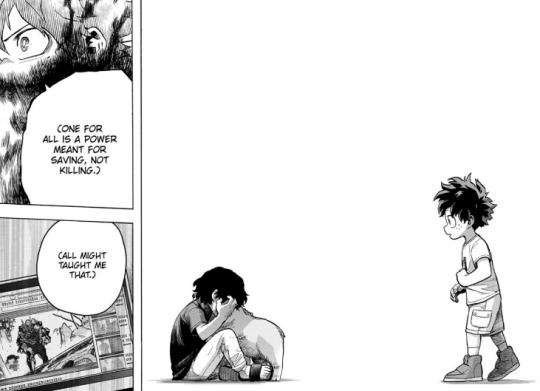
Scenes like this clearly telegraph what the answer / conclusion Hori is leading us to to be. The same way that Toya is a Todoroki is foreshadowed long in advance, statements like "All for one is a power meant for saving, not killing" clearly set up Deku's Endgame. Deku's end goal is to find a way use his power to save Shigaraki rather than killing him. Everything else is just a matter of deliberation, Deku knows what his edgoal is but the chapters between then and the end of the manga is Deku having to figure out how exactly to save Shigaraki without killing him.
You Heroes Hurt Your Own Families Just to Help Strangers
Invincible is the story of Mark Grayson, the son of Omni Man / Nolan Grayson. He's been told all of his life that his father is a viltrumite, a race of benevolent aliens who send out people like Nolan to alien civilizations in order to uplift their entire civilization. Which is what led Nolan to come to earth and become Earth's greatest heroes.
This turns out to be a big fat lie when within 12 chapters Nolan not only slaughters the guardian's of the globe, but also has a confrontation with his son.
Mark has wanted to be just like his dad his entire life. Only to be slapped in the face with the realization he's known nothing about his dad his entire life, shown rather brilliantly by these panels where Nolan tries to have a normal father / son conversation with Mark while covered in blood.
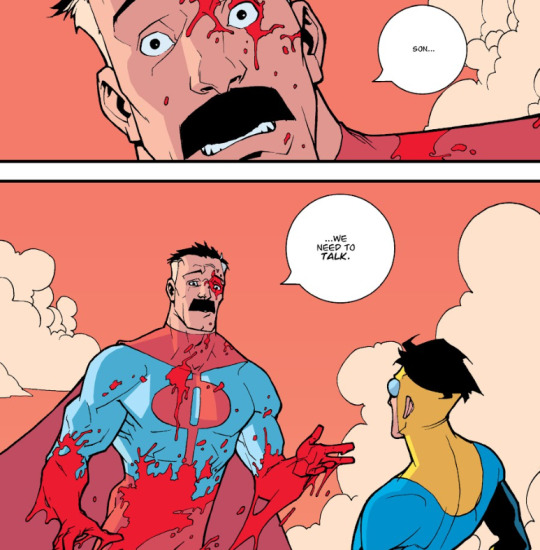
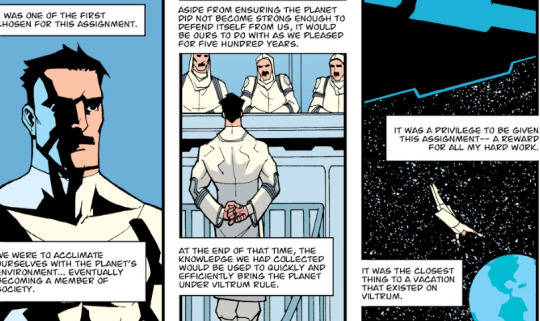
Nolan isn't from a futuristic utopia but from a brutal, fascist space empire. He didn't come to earth to help bring it up, but to weaken its defenses and make it prime for conquering. He didn't have Mark out of love, but to produce another soldier for the viltrumite empire.
Mark's entire schtick is that he's invincible, but he's so inexperienced as a hero that he gets beat up constantly despite the fact he has the strongest power set in the series b/c he has viltrumite powers. However, not only does the series introduce moral greys by continually showing how Mark even with the best power set in the series constantly gets his ass kicked, it also challenges Mark's black and white thinking and hero worship of his father by showing him the kind of man his father really is.
Mark has wanted to be exactly like his father his entire life, but now that's suddenly a bad thing. His father is a morally reprehensible person and Mark is now a descendant of an alien race meant to conquer worlds. Not only is Mark confronted by who his father really is, but now everyone in Mark's life judges him by comparing him with his father.
Mark has to work with Cecil and be his on-call Superhero, both to be able to pay for college, and also to prove that he's not his dad. The unspoken part of the agreement is that Cecil gets to keep a leash on Mark and Mark has to prove that he'll never turn out like his father to earn Cecil's trust.
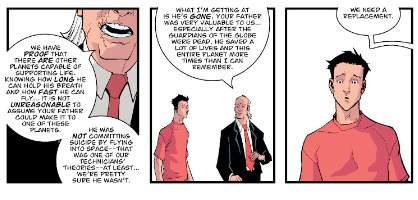
Cecil is automatically suspicious of him because if Mark were to turn evil, the planet would have no defenses against him just like it didn't have any for Omni Man. Mark's mother starts to drink and blames Mark for Omni-Man leaving in a drunken moment of weakness because of how much the information that Omni Man only regarded her as a pet affected her.
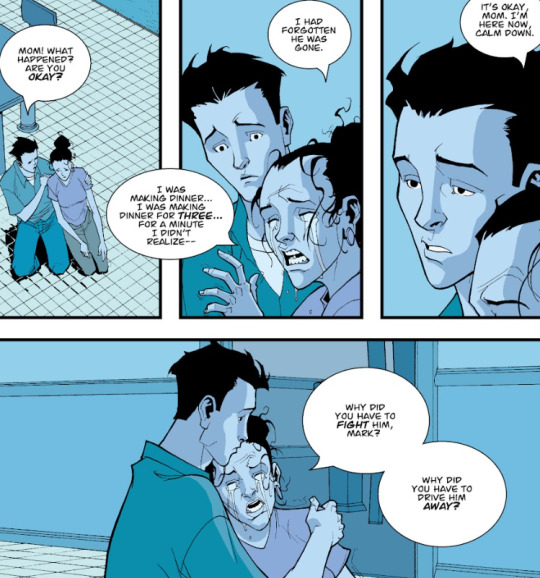
The comic even shows us that in most alternate universes, mark actually did make the decision to join his father's conquest, and this universe is one of the few exceptions. This is also where we're introduced to a major reoccuring antagonist in the comics, and also the main antagonist / final antagonist of season 2 of the cartoon Angstrom Levy.
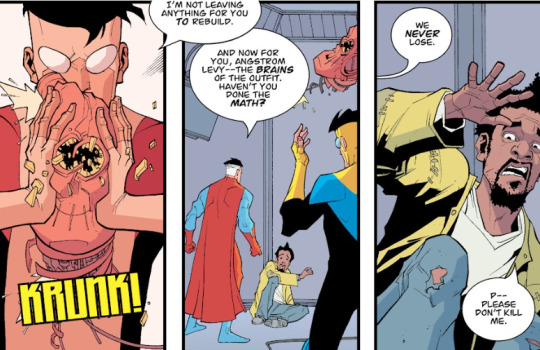
Levy is someone who can jump between dimensions and has traveled to almost all of them collecting his alternate selves. He has witnessed for a fact that in most universes Mark sides with his father instead of fighting against him.
Levy enlists the clone bros to build a device that would combine the knowledge of his alternate selves into one individual. This device ends up breaking tragically (partially mark's fault, but levy himself made the decision to stop the machine in order to stop the clone bros from killing Mark). Levy's memories become confused as a result of the machine malfunctioning, and he can't tell the difference between himself and his alternate universe counterparts. This means that Levy now remembers several alternate universes where Mark did turn evil, and remembers them as if they happened to him.
It's better elaborated upon in this post:
The process by which Invincible has had to condense and consolidate the plot beats of the original comic, coupled with the opportunity it's granted the writers to tighten up and emphasize its themes on a second pass, has resulted in a newfound appreciation for how unbelievably fucking good Angstrom Levy's whole character concept is. What's that, Mark? Your main emotional crisis this season is your fear of turning out like your father? Here, have an archnemesis who's out to kill you because his memories were inadvertently overwritten with the lived experiences of hundreds of alternate versions of himself whose friends and families were slaughtered in worlds where you did, in fact, turn out exactly like your father. Because it turns out that that is in fact the multiversal norm. That you turn out like your father. And now you're left to wonder what set of arbitrary coinflips pulled you back from that abyss in this dimension, and whether your luck is going to continue to hold into the future.
Mark is not only hit with the revelation that his father isn't as good as he thought he was, but also while he's in a crisis about about whether or not he will turn out like his father, he learns the answer is yes, in several dimensions he turns out exactly like his father.
In My Hero Academia there are families like the Todoroki's who balance the difference between a hero's obligations to society, and a hero's obligation to society. However, that's a side plot where I'd argue that the main plot for Invincible and it's main focus is what Mark owes to the world as a hero, and what Mark owes to his family.
It's not just that Omniman is trying to invade earth for the Viltrumite empire. It's not just that he failed as a hero, but that he failed as a father. What makes Mark snap, is hearing Omniman call Debbie a pet. Until that point Mark was in denial and still trying to reason with his father.
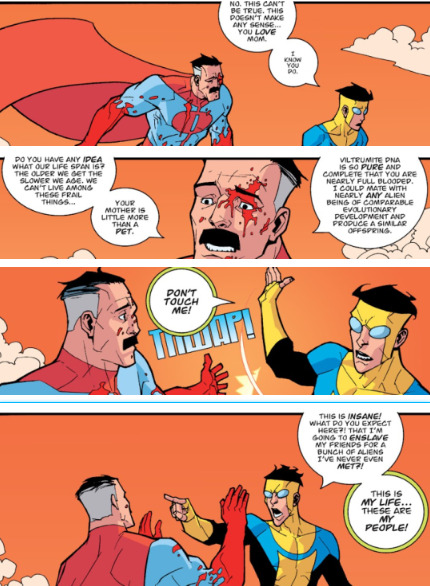
Invincible is about two intersecting themes: Is Mark obligated to use his incredible powers to help make the world better? Can Mark be a good hero and a good family man?
While MHA has more far reaching societal implications in its themes and questions, Invincible is more specifically about the Grayson Family. It's generational trauma on a society level, vs generational trauma on an individual level. The way Nolan was raised on Viltrumite effects how he raised Mark causing their conflict, and Mark's conflict with his father effects most of his young adulthood when he's trying to figure out what person he wants to be (read: not his dad), but also the way he parents his daughter with Atom Eve.
Omni-man failed Mark as both a hero, and a father. Mark feels the need to overcompensate for what his father did the world and all those innocent people by acting as Cecil's lapdog and doing whatever Cecil tells him.
However, Mark is much more hurt by the personal betrayal than he lets on. It's not just that his father killed a bunch of innocent people, it's also that Mark's father failed as a father, abandoning both him and mom and choosing to be a viltrumite rather than being Mark's father. Mark's stated reason for wanting to be a hero post the omni-man reveal is to prove he's not like his dad to the world, and also make up for the innocent lives he failed to save. However, his unstated underlying reason is Mark is hurt and betrayed his father didn't put his family first, and this causes Mark to always put his family first.
This leads to two insecurities / narrative flaws. One, Mark is insecure about becoming like his father so he tries to prove he's nothing like him by being the most selfless, perfect hero possible. Two, Mark is hurt by being abandoned by his father and doesn't want to become a deadbeat like Nolan so he gets extremely overprotective of his own family.
These two things are obvious in conflict with one another: A hero has an obligation to the common good which sometimes means sacrificing time with your loved ones. However, being a good family man requires a level of selfishness that directly contradicts the selfless hero that Mark is pushing himself to be. In the comic the way Mark prioritizes his family and loved ones over the common good and justice is made even more obvious. His first instinct on seeing Omni-Man again isn't to call him out for being an awful father, but to hug him and ask him to come home. Mark is a distraught son first, and a hero second.
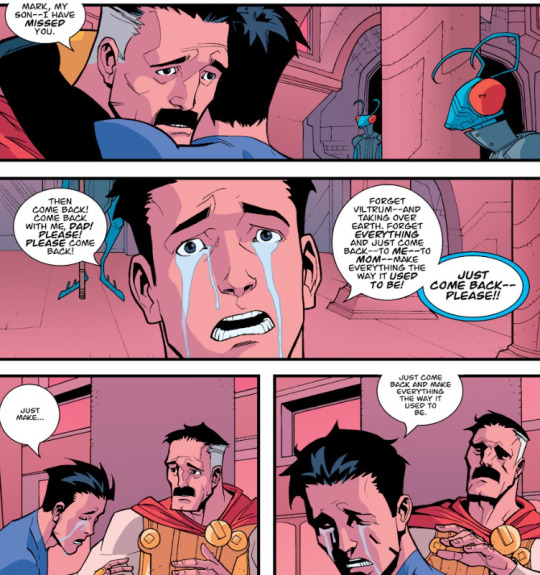
Mark has two flaws, his fear of being like his father makes him try too hard to be a perfect hero, and his trauma over losing his father makes him prioritize his family over being a hero. It's very much a having your cake and eating it too situation, oftentimes heroes make huge sacrifices for their personal lives in order to be heroes, that's basically a theme discussed in the comic with Nolan being absent for a lot of Mark's childhood, and why Mark's relationship with Amber fails.
The show also introduces us to the idea that Mark is so afraid of becoming like his father that he deliberately holds back his punches. Which is good when he's fighting earth villains, but bad when he's facing viltrumites who can only survive being disemboweled, but will also come to wipe out all life on earth if they're allowed to live. In the show it's directly mentioned that Mark is holding back, in the comic it's implied when we see how helpless Mark is in the fight against other viltrumites. Mark lacks the resolve to kill someone and when fighting a viltrumite, failing to put them down can have consequences because they are galactic conquerors who will not show you any mercy.
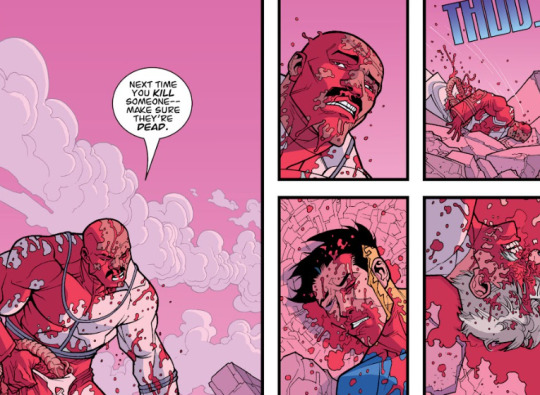
This all comes to a head in the Angstrom Levy fight where Mark makes his first kill on-screen when beforehand he'd never fought to kill before, and even held back against galaxy conquering aliens who were out to murder him and his dad.
However. before we begin that.
Should superheroes kill?
People often act like whether or not super heroes should kill their villains is a black and white topic, where it actually depends highly on context.
Batman’s an entire character is written around how he wants to redeem Gotham and save the city, most of his villains aren’t even sent to prison they’re sent to Arkham a facility that’s supposed to rehabilitee the mentally ill so they can rejoin society. Batman has decided it’s his place to stop crime, not his place to decide whether or not people have the right to live or redeem themselves.
Batman is also at risk for being just like his villains, that’s why he’s foils with Harvey Dent, someone who tried to prosecute people under the law who then snapped and went full violent mobster vigilante. Batman actually is at risk for walking the same path as Harvey if he decides murder is an option.
In X-Men 97, there was a character known as Rogue who dropped Simon Bolivar Trask off of a building in an act of vigilante justice. This action makes sense in context for several reasons. One Rogue was raised by Mystique and Destiny, is a former member of the Brotherhood of Evil Mutants, and began as a terrorist in the comics. She's not really a "moral highground" character like Batman. Two, Boliver Trask built a giant killer robot that resulted in the deaths of millions in Genosha which Rogue is a survivor of. Number three, Trask had no sympathetic reasons for building the genocide robot, he built the sentinels out of bigotry to wipe out mutants. He's not a victim in any way, he's an oppressor facing consequences for his actions.
Batman shooting Harvey Dent, his former best friend, a victim of severe mental illness and trauma that still has hope for recovery, and Rogue dropping the guy who made a genocide robot off of a building are both wildly different situations.
So in the context of MHA we have Shigaraki Tomura, a terrorist who's goal is to destroy japan enough that it will dismantle the hero system for good. Shigaraki Tomura is a ten year old child who lost control of his quirk and killed his family for mistake, he wandered for days in crowded city streets but not a single hero stopped to help him, then he was found by the main villain of the story and groomed for ten years into becoming his successor. Shigaraki is also surrounded by a group of societal outcasts who were failed by society in similiar ways, so Shigaraki knows he wasn't the only one failed by hero society and he starts to wage his war for their sake as much as his own.
In Invincible we have Angstrom Levy. Angstrom is not plotting mass murder the way that Shigaraki is. He is specifically only targetting Mark Grayson's family for revenge (at least the first time he showed up, the second time during the invincible war arc was different). Angstrom's revenge against Mark Grayson is misplaced, but to be fair the accident messed with his brain hardcore and he doesn't remember clearly what happened. He doesn't remember that he's the one who decided to stop the machine in order to help Mark. It's tragic. Angstrom also has the memories of like hundreds of different universes of evil Marks. Even though he's the victim of a tragic accident, he's also a victimizer in that he doesn't choose to just go after Mark, he deliberately picks Mark's family, his mother, and his infant little brother as a way of hurting Mark.
So both of these characters blur the line between villain and victim, but neither of them are like Trask in that they have no sympathetic motivation whatsoever. Shigaraki's actions don't come from bigotry, and he's not an oppressor. Trask was actually trying to do something good before his machine broke and his brains got scrambled, and now he wants personal revenge and to blame all his problems on Mark which is petty yes, but not on Trask's level of heartlessness.
So, there's a case that can be made here for both of them that there's room to save them. After all Mark and Deku aren't killers to begin with. Mark especially has an incredibly vested interest in not becoming a killer. Even if they don't explicitly go out of their way to save and redeem these two people, we're still at this point expecting the heroes to at least take down these two sympathetic figures non-lethally. Mark doesn't want to be like his dad and Deku has said explicitly he wants to save Shigaraki, and that OFA is a power for saving and not killing.
Also to sidestep this argument before people comment on my post with it.
What do you expect the heroes to just let a mass murderer live?
YES!
It happens in comics literally all the time.
Magneto, Wolverine, Jean Grey / Phoenix, Emma Scott, heck, OMNIMAN himself, all characters who have killed lots of people and all characters who get to live and even be on the heroes side. Of these three Jean Grey of all people has the highest body count.
Shonen Jump also has Vegeta. Have you ever heard of Vegeta? Most popular Shonen Rival of all time? Omni-man and Viltrumites are basically just Saiyans.
In real life they wouldn't let a mass murderer walk away but comics are not the same as real life. That's why characters are always punching dinosaurs all the time. Fun fact, if you were to try to punch a dinosaur in real life it would probably hurt your hand. I would advise against it. Dinosaurs are for the most part much stronger than human beings.
As I outlined above Shigaraki and Angstrom are different characters than Trask. They might all be murderers, but the first two have sympathetic elements and are humanized, they are victims of oppression (Angstrom's been killed by viltrumites in a whole bunch of worlds) whereas Trask is an oppressor.
So for both of these stories we are not expecting to see Deku and Mark kill their final villains (for the series and for this season). Deku because he's spent the final third of the series trying to work out a way to save the villains, and Mark because he doesn't want to turn out to be a violent murderer like his father so he's trying to be the most selfless, most perfect hero ever.
I THOUGHT YOU WERE STRONGER
So we finally reach the scenes in question and I thought I'd compare them without much commentary, just highlighting what happens without adding much spin.
So the final episode of Invincible Season 2 and Issue #33 of the comic is where Angstrom and Mark have it out. Angstrom appears in Mark's home and threatens his family. he brings up the comparison between Mark and his father right away. This is also something Angstrom has seen first hand by traveling to multiple universes where Mark has sided with his father.
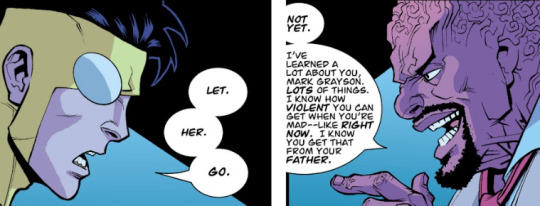
In the cartoon he's a lot more confused because he's constantly remembering other universe's memories as if he were his own so he genuinely thinks he's taking down an evil viltrumite, in the comic he's being more petty and blaming Mark for his deformity (I think he doesn't remember that he was the one to take the helmet off by choice). In both versions he uses Mark's family as hostages to keep him from fighting back as he tries to send Markk to his death in several different realities.
Angstrom then ups the threat of violence from holding them hostage to threatening to kill them. In both the show and comic he brutally breaks Debbie's arm. Mark is sent through several more realities, only to discover that Debbie's arm is broken and lose his temper.
Mark and Angstrom's fist fight comes to an end, and while Mark has him on the ground he keeps hitting and hitting and hitting long after Angstrom stopped fighting back. Which is what prompts the famous "I thought you were stronger..."
Now, in this situation it looks pretty justifiable that Mark attacked Angstrom so aggressively,. it was self defense for one against a man trying to kill him and he only got truly aggressive after he saw his mother's arm get broken. Not only that he didn't intentionally kill Angstrom, you can argue he went too far in a case of clear self defense. Other people even tell Mark that this one isn't on him, including Cecil who compares Mark to his father the most.
Then, why is Mark so disturbed?
It's because this....
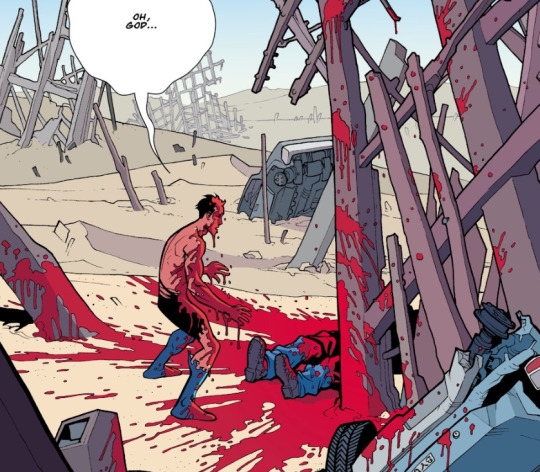
Is a deliberate parallel to this...
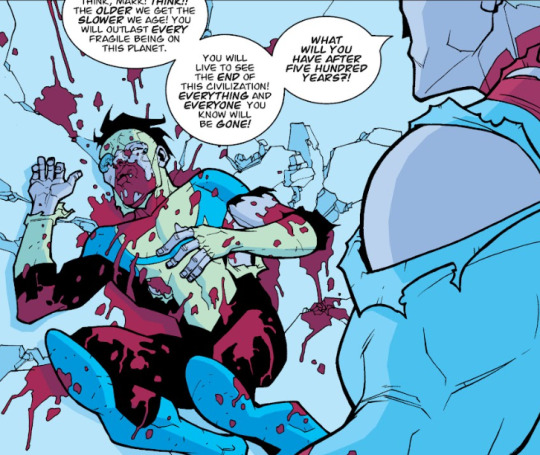
It's not just that Mark killed a man, it's that he killed a man by pounding on him relentlessly long after he'd stopped fighting back the exact same way his father did to him during their fight.
There's a difference between Mark say, fighting against a viltrumite and making a deliberate decision to kill them because of the danger that viltrumites represent to other people considering they are planet conquerors, and Mark killing this man because he lost his temper and couldn't control his own strength.
Mark spends the entire season trying to not be like his father, only to see first hand that he's capable of the exact same violence that his father is. The last episode of Season 2 summarizes this moment pretty perfectly in a montage of season 1 moments while Mark screams and breaks the sound barrier trying to push his viltrumite powers to their limits.
Mark: I'm strong enough and I can do this. It's all I've ever wanted for as long as I can remember. I want to do what you do. I want to be just like you.
Omni-Man: You will be, son. You will.
Mark screaming.
Omni-Man: You'll outlast every single fragile being on this planet. You'll live to see this world crumble to dust and blow away. Everyone and everything you know will be gone.
Mark screaming.
Cecil: You know who else said that to me?
Mark: I'm not my dad.
Mark screaming some more.
KRegg: Your father will be execute and you can return to earth. You will assume the mission to prepare earth for our rule.
So not only is Mark hit with the realization that he's just as capable of being violent and angry as his father is. He also is being forced by the situation to become more violent out of pragmatism, because if he doesn't get strong enough to fight viltrumites then they're going to come to his planet and take everything.
Not only has Mark lost some of his innocence, he's also being forced to throw the rest of it away. It's why Mark drops out of college at the end of the season because any pretense of balancing between his human life and his duty as a hero is gone. He is basically forced to be a viltrumite full time now and will abandon any semblance of trying to live his own life for a very, very long time until his relationship with Eve starts to get serious.
Which is why a pretty justifiable murder in this context is presented as so bloody, gruesome and traumatizing an event for both the audience and Mark himself. We both know there's no coming back from this.
As for the death of main series villain Shigaraki Tomura, Deku ends up being forced to kill Shigaraki in a situation similiar to Mark. Though I will highlight one difference right away. Mark was trying to reason with Angstrom, but he was at no point like "I want to save Angstrom, he's a victim I want to find some other way of ending this bloody conflict between us." Mark just didn't intend to go so far as killing him.
Deku entered the fight with the explicit stated desire to save Shigaraki rather than killing him, which would make him different from the previous generation of heroes because he wouldn't turn a blind eye to society's faults and victims like Shigaraki accused him of.
Deku makes a journey into Shigaraki's mental landscape to find Tenko in a recreation of the memory of the day of his worst trauma. As Tenko's quirk activates, Deku attempts to grab the little boy's hands to comfort him.
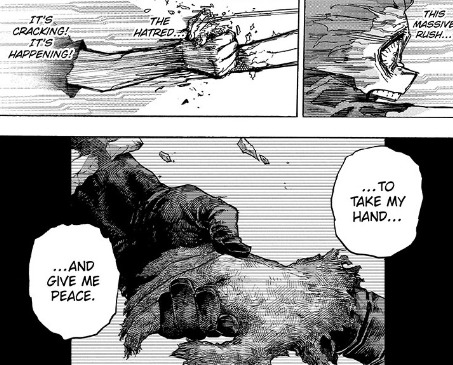
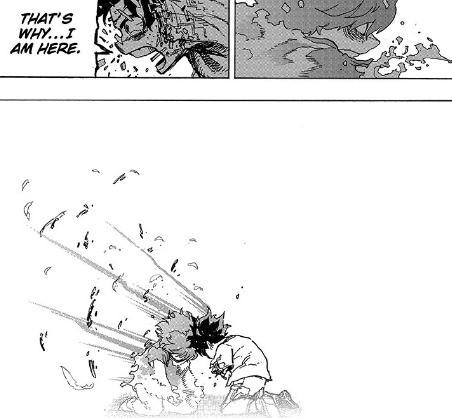
Deku's "Why I am here" is markedly different from All Might's. Deku says the reason he wants to save others is to take their hands, comfort them and give them peace, whereas All Might as the strongest hero tried to keep peace by beating all the villains down. Deku's way to become the greatest hero once again, focuses heavily on saving others, and offering his hand to everyone without hesitation instead of picking and choosing who to save like previous generations.
Deku even says that he has to extend a helping hand to everyone because he's learning that the world is more complicated than he thought, he was ignorant to a lot of people's suffering, and he can't sweep their pain under the rug anymore.
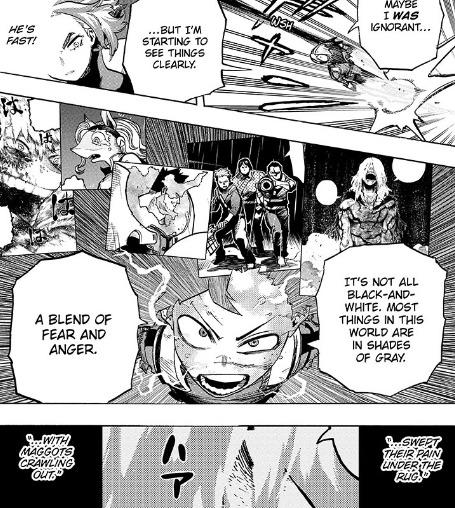
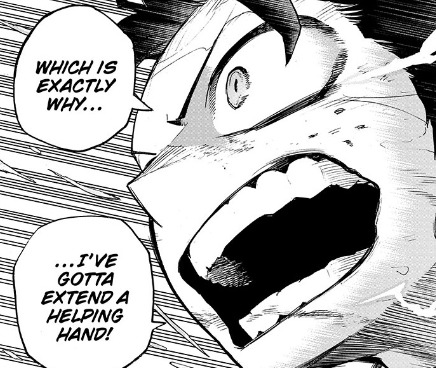
For a moment Deku unconditionally extending a hand to Shimura Tenko even as his mental body begins to decay away wins over Shimura Tenko. Though Shigaraki also resists because much like Twice he doesn't want to abandon the rest of his friends even if it means he personally will be saved.
However, any attempts to save Shigaraki are interrupted by AFO suddenly appearing out of nowhere and taking control of Shigaraki's body yet again.
At this point Deku does exactly what Mark does, which is relentlessly punch Shigaraki's body to death in order to kill AFO along with Shigaraki. In some small defese Shigaraki was also there too punching AFO in his mental landscape so he was assisting Deku in defeating AFO he wasn't helpless the entire time.
But, basically we see the same scene happen with Mark.
A hero who does not wish to kill is forced by circumstance to kill a villain. In Deku's case it should be even more devastating because they explicitly went into the fight wanting to save Shigaraki and they believed their power was for saving and not killing.
Yet, we don't get nearly as horrified a response from Deku.
However, instead Deku's final words are just about how he couldn't forgive Shigaraki and had to put a stop to him no matter what.
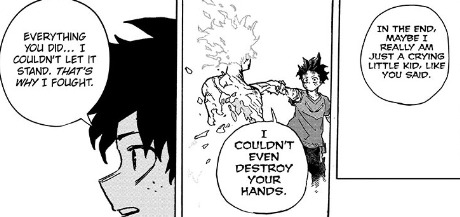

Even the way the scenes are presented to us are entirely different. Mark punches Angstrom in a wasteland a dry, dead place, until he's soaked in Angstrom's blood, and painted everything around him red. Once again, it's a visual callback to Mark's father beating him half to death, which was Mark's own lowest point.
Whereas, when Deku punches Shigaraki until he disintegrates not only is the violence or horror of Shigaraki's death not acknowledged, but it's played as a triumphant moment where the clouds clear from the sky and the stun starts shining.
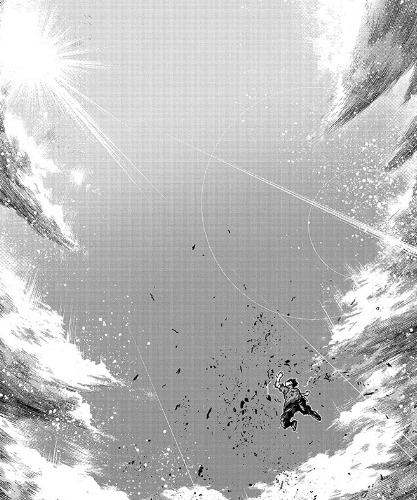
In the cartoon Mark killing Angstrom leads to a total screaming breakdown where he has traumatic flashbacks of his dad beating him and pushes himself to break the sound barrier multiple times. It also leads him to making big life changes like dropping out of college to become a hero full time and giving up any pretense of having a normal life. As seen in a scene where he watches Amber from the sky, and is tempted to go down and greet her and just flies off, because Amber represents his connection to his humanity.
Also, Angstrom doesn't even die. He comes back way worse and that's how invinicble war arc starts.
In the aftermath of killing Shigaraki, Deku gets melancholy about not being able to save Shigaraki only to be reassured he did save him in the end. Only to be told by All Might that it's okay because he still saved Shigaraki's heart even if he killed him.
DEKU:
"I couldn't save Tenko's life."
"I reached out to his heart, and even though his hatred was crushed,"
"to the very end, Tenko"
"was the leader of the League of Villains."
ALL MIGHT:
"Let me tell you this as someone who has had a near-death experience,"
"I think it's in the expression on his face at the end."
"If there wasn't a crying boy there,"
"I think his heart was saved after all,"
People also try to convince mark that he did nothing wrong and that there was no helping what he did in a situation like that, but he doesn't let himself believe them.
The ending lines about the last episode of Season 2, are this:
Eve: I'm sorry Mark. It's not fair. You don't deserve this.
Eve: You don't deserve this.
Which has a double meaning. Eve is just trying to comfort Mark, because arguably he shouldn't have to feel guilty for fighting in self defense. On the other hand what Mark hears is You don't deserve this in the context of Eve's feelings for him. An alternate timeline version of Eve confessed her love for Mark. Mark was about to bring it up but decided not to. At that moment as Eve embraces and comforts him, what Mark hears because of his own self loathing is that he doesn't deserve Eve comforting him, or her love for him.
Just to clarify I don't think that Mark is crying over Angstrom Levy specifically. In fact over time he's painted to be pathetic in his obsession with revenge, and what he amounts to is just wanting to blame everything on invincible when it was partially caused by his own actions.
However, it's inarguable that killing (or rather seemingly killing Angstrom) deeply impacted Mark and how he saw himself as a hero. It's less about Angstrom, and more about the loss of control, and the realization of how powerful his anger and hatred can get and what that means for him personally.
It also shows us where Mark's priorities lie. Mark wants to be a perfect hero and a perfect family man, and Invincible shows us he can't be both, his desire to protect his family leads him to staining his blood when he was trying so hard to be a good, selfless hero. This is all a part of a deliberate arc where Mark chooses more and more to value his family over being a hero. I'm not going to say whether or not it's the right choice, but it's a choice he makes, as a part of his character development where as he grows up and becomes a father his priorities change.
My point is that this moment has an impactful change on Mark, for arguably the rest of the comic.
Now my question is, with My Hero Academia will the death of Shigaraki Tomura, the series greatest villain and it's greatest victim have an equal impact on Deku's character that Levy's death did on Mark's?
#bnha 424#bnha spoilers#invincible#mark grayson#deku#izuku midoriya#mha 424#mha spoilers#omni man#bnha meta#mha meta
145 notes
·
View notes
Text
Sad news everypony, my climbing helmet has gone AWOL, suspected abduction. Just got a new used one (and it's a pezel!) So now I have two weeks to make it Batman themed because I am determined to learn sport climbing this year. However all my gear is Batman themed because I committed to a bit with all my bouldering junk.
#Do I still have the Batman helmet? Yes but it's not safe for sport or trad just my low risk bouldering#I'm going to draw on it to make it Batman themed since it's red and also weirdly enough has stickers onit#To the exact place I'm moving to??? Which is wild???#I will gladly share it on here when it is finished#Well my crash pad is neon pink but it shall remain the only outlier
14 notes
·
View notes